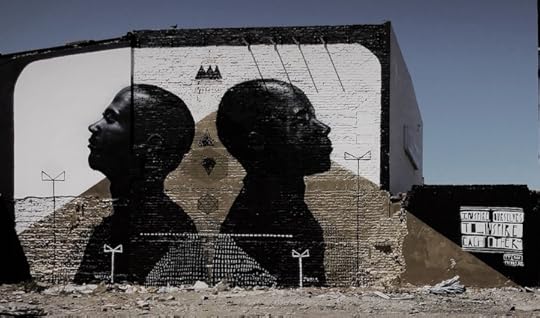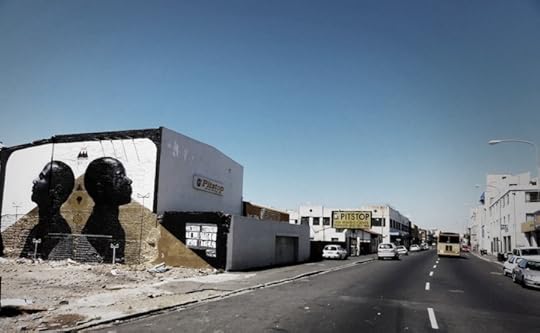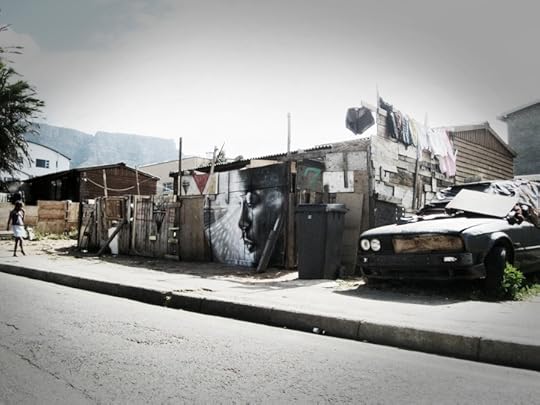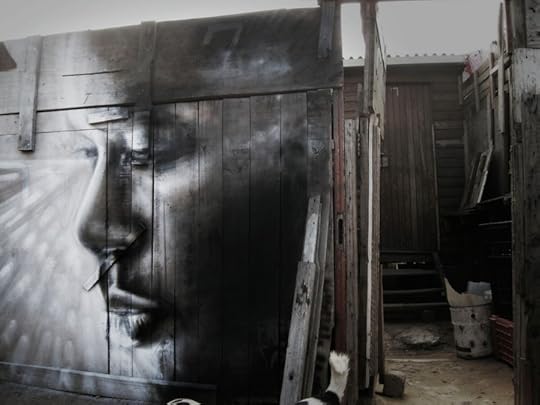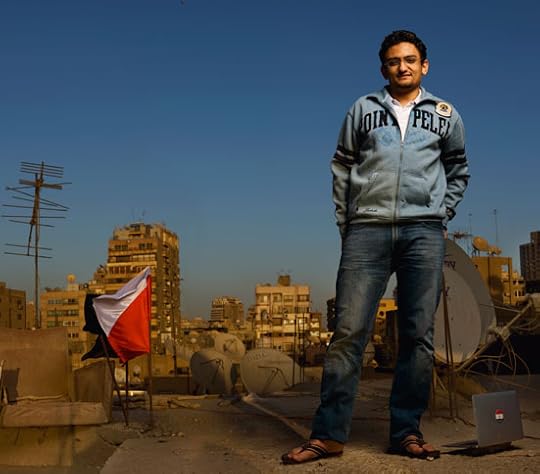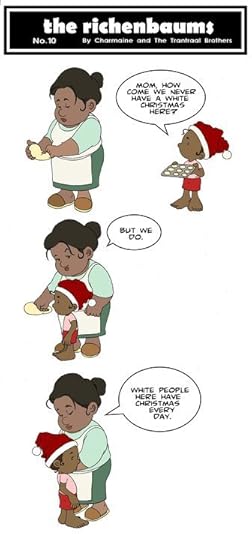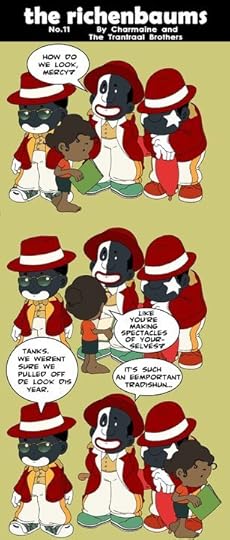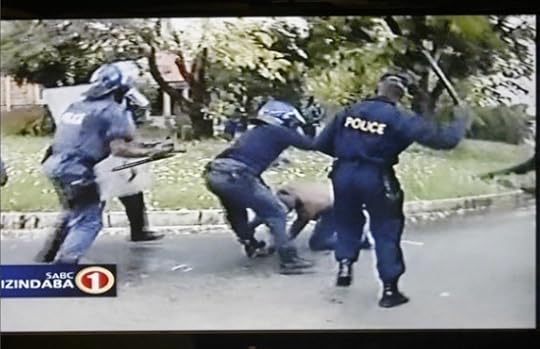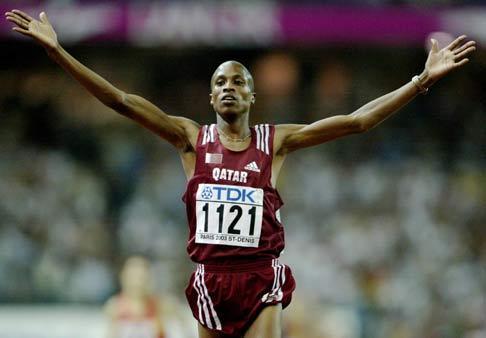Sean Jacobs's Blog, page 658
April 15, 2011
'Write on Africa'
Since we are on a roll with Woodstock, Cape Town, here's a profile of graffiti artist Freddy Sam (government name: Ricky-Lee Gordon) by the same people who brought you the shaky cam and hyper-bright colors. We like it. The art and the film.
Below are images (from Freddy Sam's Flickr stream) of some of the work featured in the video:
H/T: Nerina Penzhorn








'An All Dutch Affair'
The Dutch could not win the World Cup, now they're trying to ensure they win something. The organizers of this year's Utrecht Marathon has decided that while foreign, especially African, athletes can participate in the race, they can't win any of the prize money on offer for the winners. The reason: the Dutch are tired of foreigners winning the race.
Serious. The video report above–discussed in this week's edition of What's Up Africa! is from Radio Netherlands International. Some of the comments by Dutch marathon runners and trainers sounds eerily like some place else but at the same time not very surprising.








'The New Arab Narrative'
Is the new narrative of Arabs and north Africans simply "replacing the long held 'Arab Exceptionalism' narrative, which held sway for decades and argued that Arabs because of sociological and cultural reasons are 'immune' to democracy and democratization"? This new all-encompassing story imposed on the "so-called 'revolution' and more broadly the Arab world is being constructed by the media (international and local), academics, politicians, and the local elite," writes Rabab El-Mahdi in Jadaliyya.
The Charge:
[T]he new grand narrative of "Arab Awakening" both academics and the media (international and local) are appropriating, interpreting, and representing the recent events along the same pillars of othering and, romanticization, while casting universalist-Eurocentic judgments.
In the case of Egypt, the recent uprising is constructed as a youth, non-violent revolution in which social media (especially facebook and twitter) are champions. The underlying message here is that it these "middle-class" educated youth (read: modern) are not "terrorists," they hold the same values as "us" (the democratic West), and finally use the same tools (facebook and twitter) that "we" invented and use in our daily-lives.
Because stories with such defined categories of good and evil are "based on the Orientalist binary of 'traditional' versus 'modern,' and 'East' versus 'West,'" they "cannot include the use of molotov hand-bombs, which is 'violent-traditional' (read: Oriental) alongside with facebook, which is 'peaceful-modern' (read Western)."
The comments below the article reflect plenty of dissent – El-Mahdi's thoughts were not swallowed without some spitting out.
But really, the point may be this: can our desire for "cosmopolitan" Others also inculde the possibility that they "torch police-stations"? And that using Twitter and Facebook does not diffuse powerful differences (and therefore deflate the potency of those differences), or make any set of "them" like "us" — no more than a common costume of jeans and hoodies might?








The Coloureds
[image error]We sent 5 Questions to South African comic artists Nathan and Andre Trantraal. Born in the Western Cape, The Trantraal Brothers are known for their weekly cartoon in the local newspaper. The questions were sent out to both brothers. Nathan got back to us saying "the answers are mine and although we share most of these opinions, feel free to contribute all brutish comments to me and whatever else you find of real value to my brother Andre."–Tom Devriendt.
You drew some South African press attention with the publication of "Coloureds". Your new drawings picture "The Richenbaums". Who are The Richenbaums? And what have been the reactions to The Richenbaums so far?
The Richenbaums is a strip about a dysfunctional coloured family. And I know what you're thinking. What coloured family isn't? But the difference with The Richenbaums is that they never realize they're dysfunctional. They are a really happy family. We based the strip on a family that my mother grew up with in the 70's. They were neighbours and close friends of the family. Originally we thought we might set the strip during Apartheid, and I'm still not quite sure why we didn't go with that. It seems like a great idea in retrospect. But I guess we would have been cancelled by now anyway. About the reception of the strip: Well, suffice to say it has been a mixed bag. Not all of the Cape Times readers liked it, and from the outset criticism started rolling in, about the way how some of the characters spoke — because the strip is in English and the characters we based The Richenbaums on were working class, we decided to make them speak in a sort of made-up English. Mostly we had them speaking English the way they would spell it, so basically a lot of the dialogue is simply misspelt. This also led to accusations of the strip and its creators being illiterate. Adding to that furore, around Christmas time and New Year's we published two strips back to back that touched on classism and the other racial stereotypes. I have never seen white people more upset since the Grinch stole Christmas. People were asking for the strip to be removed from the paper and for a while we were branded as racists — never mind the fact that one of these strips dealt with racist stereotyping within the coloured community itself. But anyway, I make it sound all bad, because on the other end I have met a lot of people who love the strip. People who never even read cartoons tell me they love The Richenbaums and that they relate to the characters's situations. I know of people who work in factories who never buy The Cape Times except on a Friday, and they tell the manager to buy a dozen copies to circulate through the place. So it's cool beans.
Already publishing The Richenbaums on a weekly basis in the Cape Times, you have also decided to make the series available on Facebook and Twitter. Why? Are these social media more than an extra channel through which to get yourself known?
We don't actually publish the strip on social networks to get ourselves known or promoted. There isn't real reasoning behind that. Except that people sometimes wonder — with the Cape Times being a regional paper — how to get the strip in Johannesburg or wherever. And the same goes for folks from overseas. If someone digs what you do but they have no access to it: that really makes me feel lousy. Availability is everything to me. And that's what I love about the internet: stuff I could never get access to here in South Africa, now I can find browsing the web. I know someone will have uploaded it onto a file sharing page or something, often stuff that he or she paid for, even when there's nothing in it for them… We have benefited from that for years, from music to books. And I always loved that mentality. In Japan you get something called Scanlation, guys who scan whole volumes of manga comics and translate the stuff themselves and stick it onto the web just because they're fans and want to share with other fans. If we had the time to do it we would translate all our Afrikaans work into English and stick it up on the internet for free. Because I want to be part of that. It's fucking socialism. The thing with The Richenbaums is, we get paid a salary for doing that strip so I can make a living doing that, I don't need to squeeze pennies out of everything we do or make it work for every opportunity you get. I do comics because I love art and writing, and being able to really get into it is a really nice feeling. Before digital media, we used to colour everything by hand, and if someone really liked it, we would give it to them. Today people still ask why we don't exhibit our original artwork. In my mind it's like: why? You want it, you can have it, I'll draw another one some time. A while ago I read about Hergé: he never sold his original artwork, he always gave it away to friends. That's what we're on about.
In your series (both in Coloureds and in The Richenbaums) you're openly engaging 'the Coloured question', so we guess you don't mind us asking for your thoughts on Jimmy Manyi's outburst, Trevor Manuel's 'open letter' to Manyi, the South African mainstream media's way of covering these debates and the decision by popular COSATU leader Tony Ehrenreich to run for mayor of Cape Town? What are your thoughts?
I really couldn't care less about politics, especially in South Africa. I never read the papers, except the sports section and the funnies. Regarding Manyi's comments: maybe he doesn't care for coloured people or whatever, but let me just say that the average coloured person I know says a whole lot of worse things about black people on a daily basis, and believe me, black people do the same thing. The average black or coloured person is too busy eking out a living in a country that doesn't love them to be concerned about what either Manyi or Manuel says or thinks. Those are middle class issues, and it is middle class people who fight it out in the papers, so they shouldn't presume to speak for the man in the streets. The South African mainstream likes to have a black man they can laugh at, a black man who says something that is so obviously wrong they can jump at the opportunity to lampoon him. Take Julius Malema, for example. I don't particularly like the way people talk or write about him. I mean, he's a dumb bastard, but there's just something very uncomfortably self-righteous about it. Don't call a black person dumb in the media every single day. "Dom Kaffir" [dumb kaffir, TD] is what the old government used to say. And whether it is deliberate or not, it has that undercurrent.
Regarding Tony Ehrenreich: well, what can I say about him, except that someone told me recently Ehrenreich wants to heavily tax everyone living in upper middle class places like [Cape Town's wealthy suburb] Constantia. I thought that was really funny and it upset people who live in Constantia of course. I love it when rich people are offended. Other than that I don't really know the guy and I don't really care who runs the city of Cape Town. It is always going to be a drag, isn't it? I mean if Tony Ehrenreich comes in, what is he going to do that whoever is currently running the city now isn't doing yet? Nothing, probably. Because the people who elect these mayors eat up whatever is fed to them in the media. If Tony has a few cool catch-phrases and acts like the little engine that works whenever the cameras are rolling, then working class people are going to like him and they might vote for him. Then he'll get into office and the next thing he does is to remember he is an educated man. The first people who get snubbed are the people who fell for his sweet talk. It's a bit like banging a girl and then not call her back afterwards, isn't it?
So who or what is a coloured?
The dictionary describes a coloured as a small, brown person with either curly or straight black hair. But seriously, they are the descendants of the slaves brought from different parts of the world by Dutch colonizers. Places like India, Indonesia, etc., wherever they got their slaves from, and the white and indigenous Khoisan people of course. These slaves got knocked up by their Masters and that's how the first coloured babies came into existence. A coloured is someone of mixed blood and often of mixed heritage. I don't know who started calling people "coloureds". I know in America calling somebody a "coloured" would be hugely insulting and no one would even think of doing it. But in South Africa it is a common term. I guess people are a bit more laid-back here. Every New Year, coloured people have a ceremony where they dress up in colourful suites, put on black face and parade down the street. And… they call themselves 'The Coons'. I don't mean to sound disapproving when I say that. I like that. I'd say Coloured culture is influenced a lot by African-American culture. Their taste in music and clothing and even the way they use language. I often think that Coloureds have more in common with black Americans than with black South Africans. And I think that divide in South Africa has a lot to do with the social engineering during Apartheid where the government had a system classifying coloured people as inferior but black people as even more inferior. So coloureds were number 2 and blacks were number 3, and I guess you know who were number 1, elected by a peer of themselves. A lot of coloured people bought into that, so that after the fall of Apartheid that old grudge remained, which brings us back to Manyi and why you shouldn't really take it to heart. Here is something you might not know: a lot of white people are coloureds too, and no, I don't mean because they're down with the hood, no I mean like really, they have the same mixed blood. If you check the bloodline — and I've actually done some research on this — you'll find that almost everybody is mixed somewhere down the line. So no, there's no pure race any more. Sorry.
Who among your peers — artists, animators, filmmakers, musicians, bloggers, etc — make work in South Africa now that you can identify with?
I'm sorry to confess I don't even read South African comic books. The scene just doesn't really inspire us. For too long I think there were just a lot of guys out there trying to make comix, with a capital X, to indicate that this stuff wasn't for kids, when in reality this stuff was just a lot of puerile shit. They were a bunch of geeks who were very influenced by the 'underground' comix scene in America during the Seventies. Those comics were all about who could make a book with the most dicks in it. Everyone was just trying to out-gross the other, trying to be more obscene than the next guy. And for some reason — probably too complicated to go into here — that was the general direction comics went into for a long time in South Africa. I think it is starting to change a little now but one of the problems still is that all our comic book artists are bred at Universities. You have a lot of graphic designers doing a course on comics and then decide they want to draw comics. The result of that mostly being a bunch of guys who learned to draw but who can't write, because they don't read. Most of the time. So it is pitiful but that is the way it is.
The only person operating in South Africa at the moment whose work I relate to and go back to over and over again is Ronelda Kamfer. The first time I read her debut Noudat Slapende Honde, I was dumbstruck by the veracity of it all, it was gut-wrenched writing and I love something, anything, that can do that, that gives me that physical reaction. That's what Martin Scorsese did the first time I watched Mean Streets and what Joe Sacco did the first time I read Palestine. It is just something that is so unique and powerful you know you're going to have to wait another decade for another fix like this. Unfortunately I can't say there is much else that excites me around these parts. That is one of the reasons we do what we do, because I want to be entertained. If someone did the stuff I wanted to read I could go do something else, like work in a bank or something. Something relaxing.
Then of course, there is JM Coetzee, whom I think many people don't consider to be a South African anymore. I remember when he won the Nobel Prize for literature there was like a five second mention of it on the news. I was like: what?! Everything we know about approaching literature we learned from reading Coetzee. A writer on the level of Joyce, Eliot or anyone in that canon. And he writes about places I know, places I have been to and characters I know. That's amazing. For us, craftsmanship has always been very important and this is what you walk away with after you read Coetzee, the perfection of the prose and the wealth of intelligence that informs that prose. When I draw I try to approach it the way he approaches writing. Every line must be perfect. If I make a mistake when I draw, it bothers me less than when I write a weak line. Every line should be alive and have a history of its own. Flaubert called it "Le mot juste".








The Trantraal Brothers
[image error]We sent 5 Questions to South African comic artists Nathan and Andre Trantraal. Born in the Western Cape, The Trantraal Brothers are known for their weekly cartoon in the local newspaper. The questions were sent out to both brothers. Nathan got back to us saying "the answers are mine and although we share most of these opinions, feel free to contribute all brutish comments to me and whatever else you find of real value to my brother Andre."–Tom Devriendt.
You drew some South African press attention with the publication of "Coloureds". Your new drawings picture "The Richenbaums". Who are The Richenbaums? And what have been the reactions to The Richenbaums so far?
The Richenbaums is a strip about a dysfunctional coloured family. And I know what you're thinking. What coloured family isn't? But the difference with The Richenbaums is that they never realize they're dysfunctional. They are a really happy family. We based the strip on a family that my mother grew up with in the 70's. They were neighbours and close friends of the family. Originally we thought we might set the strip during Apartheid, and I'm still not quite sure why we didn't go with that. It seems like a great idea in retrospect. But I guess we would have been cancelled by now anyway. About the reception of the strip: Well, suffice to say it has been a mixed bag. Not all of the Cape Times readers liked it, and from the outset criticism started rolling in, about the way how some of the characters spoke — because the strip is in English and the characters we based The Richenbaums on were working class, we decided to make them speak in a sort of made-up English. Mostly we had them speaking English the way they would spell it, so basically a lot of the dialogue is simply misspelt. This also led to accusations of the strip and its creators being illiterate. Adding to that furore, around Christmas time and New Year's we published two strips back to back that touched on classism and the other racial stereotypes. I have never seen white people more upset since the Grinch stole Christmas. People were asking for the strip to be removed from the paper and for a while we were branded as racists — never mind the fact that one of these strips dealt with racist stereotyping within the coloured community itself. But anyway, I make it sound all bad, because on the other end I have met a lot of people who love the strip. People who never even read cartoons tell me they love The Richenbaums and that they relate to the characters's situations. I know of people who work in factories who never buy The Cape Times except on a Friday, and they tell the manager to buy a dozen copies to circulate through the place. So it's cool beans.
Already publishing The Richenbaums on a weekly basis in the Cape Times, you have also decided to make the series available on Facebook and Twitter. Why? Are these social media more than an extra channel through which to get yourself known?
We don't actually publish the strip on social networks to get ourselves known or promoted. There isn't real reasoning behind that. Except that people sometimes wonder — with the Cape Times being a regional paper — how to get the strip in Johannesburg or wherever. And the same goes for folks from overseas. If someone digs what you do but they have no access to it: that really makes me feel lousy. Availability is everything to me. And that's what I love about the internet: stuff I could never get access to here in South Africa, now I can find browsing the web. I know someone will have uploaded it onto a file sharing page or something, often stuff that he or she paid for, even when there's nothing in it for them… We have benefited from that for years, from music to books. And I always loved that mentality. In Japan you get something called Scanlation, guys who scan whole volumes of manga comics and translate the stuff themselves and stick it onto the web just because they're fans and want to share with other fans. If we had the time to do it we would translate all our Afrikaans work into English and stick it up on the internet for free. Because I want to be part of that. It's fucking socialism. The thing with The Richenbaums is, we get paid a salary for doing that strip so I can make a living doing that, I don't need to squeeze pennies out of everything we do or make it work for every opportunity you get. I do comics because I love art and writing, and being able to really get into it is a really nice feeling. Before digital media, we used to colour everything by hand, and if someone really liked it, we would give it to them. Today people still ask why we don't exhibit our original artwork. In my mind it's like: why? You want it, you can have it, I'll draw another one some time. A while ago I read about Hergé: he never sold his original artwork, he always gave it away to friends. That's what we're on about.
In your series (both in Coloureds and in The Richenbaums) you're openly engaging 'the Coloured question', so we guess you don't mind us asking for your thoughts on Jimmy Manyi's outburst, Trevor Manuel's 'open letter' to Manyi, the South African mainstream media's way of covering these debates and the decision by popular COSATU leader Tony Ehrenreich to run for mayor of Cape Town? What are your thoughts?
I really couldn't care less about politics, especially in South Africa. I never read the papers, except the sports section and the funnies. Regarding Manyi's comments: maybe he doesn't care for coloured people or whatever, but let me just say that the average coloured person I know says a whole lot of worse things about black people on a daily basis, and believe me, black people do the same thing. The average black or coloured person is too busy eking out a living in a country that doesn't love them to be concerned about what either Manyi or Manuel says or thinks. Those are middle class issues, and it is middle class people who fight it out in the papers, so they shouldn't presume to speak for the man in the streets. The South African mainstream likes to have a black man they can laugh at, a black man who says something that is so obviously wrong they can jump at the opportunity to lampoon him. Take Julius Malema, for example. I don't particularly like the way people talk or write about him. I mean, he's a dumb bastard, but there's just something very uncomfortably self-righteous about it. Don't call a black person dumb in the media every single day. "Dom Kaffir" [dumb kaffir, TD] is what the old government used to say. And whether it is deliberate or not, it has that undercurrent.
Regarding Tony Ehrenreich: well, what can I say about him, except that someone told me recently Ehrenreich wants to heavily tax everyone living in upper middle class places like [Cape Town's wealthy suburb] Constantia. I thought that was really funny and it upset people who live in Constantia of course. I love it when rich people are offended. Other than that I don't really know the guy and I don't really care who runs the city of Cape Town. It is always going to be a drag, isn't it? I mean if Tony Ehrenreich comes in, what is he going to do that whoever is currently running the city now isn't doing yet? Nothing, probably. Because the people who elect these mayors eat up whatever is fed to them in the media. If Tony has a few cool catch-phrases and acts like the little engine that works whenever the cameras are rolling, then working class people are going to like him and they might vote for him. Then he'll get into office and the next thing he does is to remember he is an educated man. The first people who get snubbed are the people who fell for his sweet talk. It's a bit like banging a girl and then not call her back afterwards, isn't it?
So who or what is a coloured?
The dictionary describes a coloured as a small, brown person with either curly or straight black hair. But seriously, they are the descendants of the slaves brought from different parts of the world by Dutch colonizers. Places like India, Indonesia, etc., wherever they got their slaves from, and the white and indigenous Khoisan people of course. These slaves got knocked up by their Masters and that's how the first coloured babies came into existence. A coloured is someone of mixed blood and often of mixed heritage. I don't know who started calling people "coloureds". I know in America calling somebody a "coloured" would be hugely insulting and no one would even think of doing it. But in South Africa it is a common term. I guess people are a bit more laid-back here. Every New Year, coloured people have a ceremony where they dress up in colourful suites, put on black face and parade down the street. And… they call themselves 'The Coons'. I don't mean to sound disapproving when I say that. I like that. I'd say Coloured culture is influenced a lot by African-American culture. Their taste in music and clothing and even the way they use language. I often think that Coloureds have more in common with black Americans than with black South Africans. And I think that divide in South Africa has a lot to do with the social engineering during Apartheid where the government had a system classifying coloured people as inferior but black people as even more inferior. So coloureds were number 2 and blacks were number 3, and I guess you know who were number 1, elected by a peer of themselves. A lot of coloured people bought into that, so that after the fall of Apartheid that old grudge remained, which brings us back to Manyi and why you shouldn't really take it to heart. Here is something you might not know: a lot of white people are coloureds too, and no, I don't mean because they're down with the hood, no I mean like really, they have the same mixed blood. If you check the bloodline — and I've actually done some research on this — you'll find that almost everybody is mixed somewhere down the line. So no, there's no pure race any more. Sorry.
Who among your peers — artists, animators, filmmakers, musicians, bloggers, etc — make work in South Africa now that you can identify with?
I'm sorry to confess I don't even read South African comic books. The scene just doesn't really inspire us. For too long I think there were just a lot of guys out there trying to make comix, with a capital X, to indicate that this stuff wasn't for kids, when in reality this stuff was just a lot of puerile shit. They were a bunch of geeks who were very influenced by the 'underground' comix scene in America during the Seventies. Those comics were all about who could make a book with the most dicks in it. Everyone was just trying to out-gross the other, trying to be more obscene than the next guy. And for some reason — probably too complicated to go into here — that was the general direction comics went into for a long time in South Africa. I think it is starting to change a little now but one of the problems still is that all our comic book artists are bred at Universities. You have a lot of graphic designers doing a course on comics and then decide they want to draw comics. The result of that mostly being a bunch of guys who learned to draw but who can't write, because they don't read. Most of the time. So it is pitiful but that is the way it is.
The only person operating in South Africa at the moment whose work I relate to and go back to over and over again is Ronelda Kamfer. The first time I read her debut Noudat Slapende Honde, I was dumbstruck by the veracity of it all, it was gut-wrenched writing and I love something, anything, that can do that, that gives me that physical reaction. That's what Martin Scorsese did the first time I watched Mean Streets and what Joe Sacco did the first time I read Palestine. It is just something that is so unique and powerful you know you're going to have to wait another decade for another fix like this. Unfortunately I can't say there is much else that excites me around these parts. That is one of the reasons we do what we do, because I want to be entertained. If someone did the stuff I wanted to read I could go do something else, like work in a bank or something. Something relaxing.
Then of course, there is JM Coetzee, whom I think many people don't consider to be a South African anymore. I remember when he won the Nobel Prize for literature there was like a five second mention of it on the news. I was like: what?! Everything we know about approaching literature we learned from reading Coetzee. A writer on the level of Joyce, Eliot or anyone in that canon. And he writes about places I know, places I have been to and characters I know. That's amazing. For us, craftsmanship has always been very important and this is what you walk away with after you read Coetzee, the perfection of the prose and the wealth of intelligence that informs that prose. When I draw I try to approach it the way he approaches writing. Every line must be perfect. If I make a mistake when I draw, it bothers me less than when I write a weak line. Every line should be alive and have a history of its own. Flaubert called it "Le mot juste".








April 14, 2011
'Insurrection'

Single released April 11th, which is the 30th anniversary of the Brixton riots that levelled much of the town centre that both Linton [Kwesi Johnson] and I call home.








'A Screaming Man'
The annual New York African Film Festival takes place till the end of May. One of the outstanding films on the program is "Un Homme Qui Crie" (A Screaming Man) by Chadian director, Mahamat Saleh Haroun. The film won the 2010 Cannes Jury Prize. Public screenings of Un Homme Qui Crie are scheduled for 26 and 28 May. The usually dour Armond White is impressed; so is Manohla Dargis in The New York Times. Here's an interview with director Haroun on the BBC:
Here's the festival's full program.








We are all Andries Tatane
Anonymous:
South Africa is far from what Tunisia was like pre-revolution (for one it is not governed by a one-party police state), but the parallels of small-town cops beating to death (here's video footage from South African TV news) a South African Everyman because his was angry with crappy or non-existent service delivery (water, electricity, roads, housing) is eerily reminiscent of a certain fruit vendor in southern Tunisia. Again, the differences between South Africa and Tunisia are too many to mention. But if you asked someone in Meqheleng (yes, I did look up the largest township in Ficksburg in the Free State Province) if they are as frustrated as your typical Tunisian circa 2010, I wonder what they would say?
Would the ANC's proper electoral mandate and liberation credentials outweigh the impression that those in power–Jacob Zuma, Tokyo Sexwale, Sicelo Shiceka, and Siphiwe Nyanda, etcetera–are amassing wealth and governing just like Hosni Mubarak and Ben Ali? I worry that a few years from now they won't care how legitimate the ruling party's mandate is: crap service delivery is crap service delivery.
That leads me this: Does that 18-year old in Meqheleng know the basic dynamics of what is happening in North Africa or the Middle East? Are vernacular radio and local papers giving the "Arab spring" coverage, at least to the point that that 18-year old realizes how crap Mubarak was and, closer to home, how dismissive the ANC leadership has been to their demands the last 17 years, basically the span of his or her entire lifespan?








The Falcon of Qatar
The Spring Issue of Middle East arts magazine,"Bidoun" magazine, is about sports. This includes a piece on "Kenyan long- and middle-distance runners who have found infamy and fortune as Arabized athletes in the Gulf" on $1000 a month for the rest of their lives. This comes with the "standard complement of elite trainers and cutting edge facilities." These athletes, mostly men from Kenya, do not actually reside in the Gulf states, according to the article, only flying back to have their residence permits and passports renewed. The article describes the case of Saif Saaeed Shaheen of Qatar:
In 2003, relations [between Qatar and Kenyan athletic officials]nose-dived when Kenyan Olympic Committee president and former track star Kipchoge Keino barred a newly Qatari runner, 20-year-old Saif Saaeed Shaheen, from competing in the Athens games the next year.
Until that August, Shaheen had been Stephen Cherono. He was not well-known in Kenya, where there is such a surfeit of world-class runners that few qualify for the national team. Hardly anyone took notice when Cherono switched his citizenship and name in exchange for a lifetime monthly salary of $1,000 and the standard complement of elite trainers and cutting-edge facilities. But then he started winning races. In a surprise victory at the World Championships in Athletics, held in Paris that spring, Shaheen broke the world record for the 3,000-meter steeplechase. After crossing the finish line he fell to his knees and began to cross himself, but an official rushed to stop him; he then took a Qatari flag, wrapped it around his shoulders, and ran a victory lap; when he stepped up to the podium he forgot his new name and had to check the scoreboard. His brother, a runner on the Kenyan team, finished fifth in the same race, and refused to congratulate him.
This jarring scene was replayed on television in Kenya and elsewhere, and Shaheen, who had received a multimillion-dollar bonus for his victory, was condemned in his homeland's newspapers. "That some Kenyan sportsmen are willing to be regarded in the same light as champion horse breeds and agree to sell their birth rights to the power of the dinar speaks ill of us Kenyans," opined the Daily Nation. Kenya's minister of sports attempted to pass a law prohibiting the country's athletes from changing citizenship at all.
The president of Kenya's athletics federation equated the practice to "trading slaves," while others compared the exploitation of African athletes to colonialism. For his part, Shaheen returned to Doha, where the sheikhs bestowed upon him a mansion and a squad of servants, as well as a title: "The Falcon of Qatar." And despite the general opprobrium back home, dozens of athletes, mostly runners and mostly Kenyan, have been Qatarized since Shaheen's public shaming.
Read the full article here.








Billy Bang
Siddhartha Mitter:
I am very sad to learn that Billy Bang has died at age 63. He was a beautiful musician who struggled with mental illness and other woes from the trauma of his service in Vietnam until he processed it in his music. I was introduced to his work by Butch Morris. Two years ago I was privileged to have a long conversation with him and Yusef Komunyakaa—this is the radio edit. Condolences to all who knew him.








Sean Jacobs's Blog
- Sean Jacobs's profile
- 4 followers


